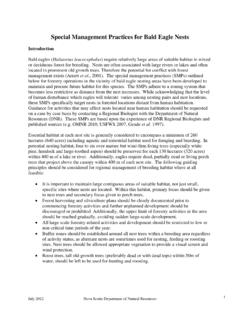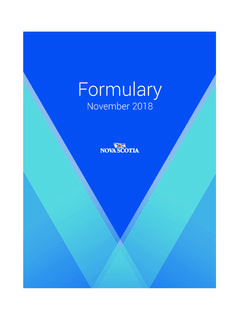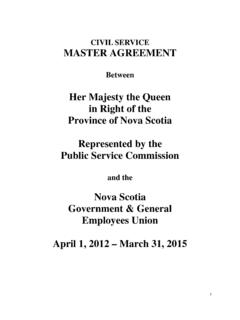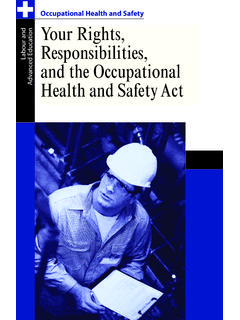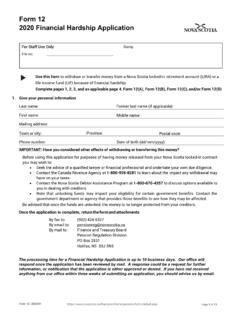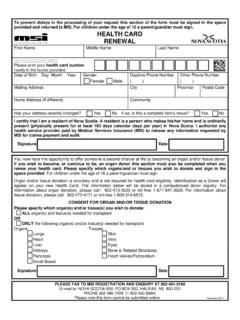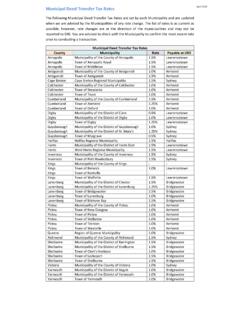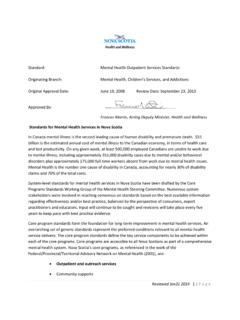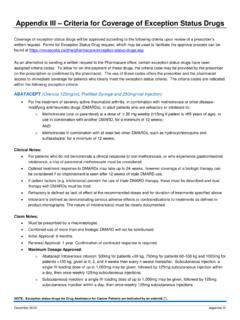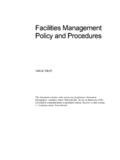Transcription of Long Term Care Program Requirements: Nursing Homes ...
1 long Term care Program requirements : Nursing Homes & Residential care facilities February 2019. Policy: long Term care Program requirements : Nursing Homes & Residential care facilities Approval Date: March 19, 2019. Effective Date: Effective as of approval date Approved by: ___original signed by Denise Perret, Deputy Minister_____. Denise Perret Deputy Minister, Health and Wellness Version Control: Version Control Policy Approval Date Effective Date long Term care Facility 2007 2007. Program requirements long Term care Program April 1, 2016. requirements : Nursing Homes & Residential care facilities long Term care Program March 19, 2019 Effective as of approval date requirements : Nursing Homes & Residential care facilities Program requirements : Nursing Homes and Residential care facilities Maintenance & Feedback The Nova Scotia Department of Health and Wellness (DHW) is responsible for maintaining the long Term care Program requirements : Nursing Homes and Residential care facilities document and for keeping it current and relevant.
2 The Continuing care Branch undertakes this maintenance role in consultation with long term care licensees and the Nova Scotia Health Authority (NSHA). If you identify any errors in this document, or if you have suggestions for revisions to this or future versions, please complete the form on the following page, providing as much detail as possible, and forward it by mail or fax to the Continuing care Branch. 1|Page long TERM care Program requirements : Nursing Homes & RESIDENTIAL care facilities . FEEDBACK FORM. Submitted by: Name: Organization: Telephone: Fax: Please identify the section and page on which you are commenting. Section: _____ Page: _____. Fax or Mail to: Continuing care Branch Department of Health and Wellness Box 488. Halifax, NS B3J 2R8. Fax: 902-424-0558. 2|Page Table of Contents INTRODUCTION .. 5. VISION FOR CONTINUING care IN NOVA SCOTIA .. 5. long TERM care PRINCIPLES .. 6. GLOSSARY .. 7. FUNDAMENTAL requirements .
3 13. Resident Respect, Dignity and Right to Privacy .. 13. Resident Choice .. 13. Family and Community Relationships .. 14. RESIDENT care .. 15. Assessments .. 15. Health Services .. 16. Individual Plan of care .. 17. Resident-Centred care .. 18. Nutrition .. 19. Oral Health .. 21. Recreation .. 22. Palliative and End of Life care .. 22. ADMINISTRATION .. 24. Management of the 24. Resident Councils .. 25. Family Councils .. 26. Management and Staff Meetings .. 26. Inspections .. 27. SERVICE QUALITY .. 28. Quality Management .. 28. Risk Management .. 29. Protection of Residents from Abuse .. 30. Infection Prevention and Control .. 31. 3|Page Medication Management .. 33. Ethics .. 34. SERVICE CONTINUITY .. 35. Labour Disruption Contingency Plan .. 35. Emergency Planning and Preparedness .. 35. INFORMATION MANAGEMENT .. 39. Information 39. Resident Records .. 39. HUMAN RESOURCES MANAGEMENT .. 41. Human Resources Practices .. 41. Staff Qualifications.
4 42. Mandatory Continuing Education .. 43. PHYSICAL SPACE .. 44. Environmental Services .. 44. Condition of home and Site .. 45. APPENDIX A .. 47. 4|Page INTRODUCTION. The long Term care Program requirements : Nursing Homes and Residential care facilities document, also referred to as Program requirements , outlines the Department of Health and Wellness' expectations for licensed Nursing Homes and residential care facilities across Nova Scotia. The Department is committed to the delivery of safe, high quality, holistic, resident-centred care for Nova Scotians residing in long term care facilities . Choice, empowerment, autonomy, flexibility, privacy, community linkages and the trend of moving away from the institutional model of care are inherent concepts in these Program requirements . This document sets out the fundamental requirements and the requirements for resident care , administration, information management, human resource management, service quality, service continuity, human resource management and physical space.
5 These Program requirements provide a mechanism for internal and external reviews and must be implemented in a manner that reflects the requirements of the Department of Health and Wellness. Compliance is monitored as part of the licensing process and ensures that Homes operate within the established criteria and are committed to continuous quality improvement. The Department has authority under the Homes for Special care Act to enter and inspect Nursing Homes and residential care facilities in Nova Scotia. Aligned with the Homes for Special care Act (HSCA) and Regulations, these Program requirements ensure that Program content is consistent with other relevant legislation including, but not limited to, the Protection for Persons in care Act (PPCA), the Personal Health Information Act (PHIA) and the Personal Directives Act (PDA). This document replaces all previous long Term care Program requirements , including the 2007 long Term care Program requirements developed in association with the 2007.
6 Request for Proposal (RFP), and reflects the minimum acceptable standards for Nursing Homes and residential care facilities licensed by the Department of Health and Wellness in Nova Scotia. Unless otherwise noted, all Nursing Homes and residential care facilities that are licensed by the Department of Health and Wellness must meet the stated Program requirements . In the event of a current or future discrepancy between these Program requirements and legislation, the more stringent requirements shall apply. VISION FOR CONTINUING care IN NOVA SCOTIA. Living well in a place you can call home 5|Page long TERM care PRINCIPLES. The long Term care Program requirements : Nursing Homes and Residential care facilities document is guided by the principles listed below: Resident and Family Focused: 1. Residents' privacy is respected and their health information is protected. 2. Residents maintain choice and self-determination even as their need for support increases.
7 3. Activities and services are designed to maximize residents' abilities. 4. Flexible scheduling of activities of daily living is supported. 5. Residents and families are encouraged to be partners in care . 6. A holistic approach to resident-centred care that addresses physical, social, cultural, mental and spiritual well-being is supported. 7. Opportunities for meaningful relationships, interactions and companionship with residents, family, staff members and the community are provided. 8. A clean, accessible, comfortable and secure homelike environment is provided for residents and their families. Staff focused: 9. A supportive, safe and efficient workplace is provided for staff. 10. Occupational and organizational health, well-being and safety of staff members are supported. 11. Innovative models of care are encouraged through a resident-centred approach to care . 6|Page GLOSSARY. The following definitions apply to the long Term care Program requirements : Nursing Homes and Residential care facilities : Abuse: Any of the following (as defined by the Protection for Persons in care Regulations, Section 3(1) : a) the use of physical force resulting in pain, discomfort or injury, including slapping, hitting, beating, burning, rough handling, tying up or binding.
8 B) mistreatment causing emotional harm, including threatening, intimidating, humiliating, harassing, coercing or restricting from appropriate social contact;. c) the administration, withholding or prescribing of medication for inappropriate purposes;. d) sexual contact, activity or behaviour between a service provider and a patient or resident;. e) non-consensual sexual contact, activity or behaviour between patients or residents;. f) the misappropriation or improper or illegal conversion of money or other valuable possessions; and g) failure to provide adequate nutrition, care , medical attention or necessities of life without valid consent. Acute home care : home care services provided to a resident with a need for time limited intervention with a goal of improving a medical or post-surgical condition. Adverse Event: An unexpected and undesired incident directly associated with the care or services provided to the resident or the environment in which the care is provided.
9 Aesthetic Integrity: No visible soiling, staining, discolouration or physical damage. Assessment: A process for collecting and interpreting information obtained through various reliable sources for the purposes of determining residents' abilities, needs and potential for maintaining or improving their health. Authorized Designates: Persons to whom the licensee shall communicate, as the case may be, on behalf of residents who do not have capacity, such as: a) a person to whom the resident has given authorization, under the Medical Consent Act; to give consent or directions respecting medical treatment;. b) a guardian, under the Incompetent Persons Act; authorized to manage financial matters;. c) a delegate or statutory decision-maker, under the Personal Directives Act, with authority to make personal care decisions; and/or 7|Page d) an attorney, under the Powers of Attorney Act, authorized to manage financial matters. Business Continuity Plan: Arrangements and procedures that enable an organization to respond to a significant event that affects normal operations and to return to normal operational functions after the interruption.
10 Complaint: Expression of concern or dissatisfaction to or about the home , either verbally or in writing. Compromised Functionality: Reduced working order or not fully functional. Confidential: Information that shall be safeguarded from disclosure and that has defined parameters for distribution. Consent: Voluntary and informed agreement by a resident, who is competent and understands the information and appreciates its implications, or the resident's authorized designate. Corrective Action: The plan that is developed, implemented and evaluated in response to an identified issue of concern in order to mitigate risk. Credential: The issuance by an authority of documentation to attest to the individual's possession of the requisites for a specific designation. Critical Incident: A serious event, affecting either the resident, staff or the public. Department: The Department of Health and Wellness. Disclosure of Adverse Event: The imparting of information from the licensee to residents, or their authorized designates, regarding any adverse event affecting the resident.
